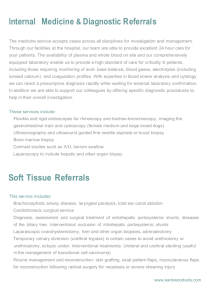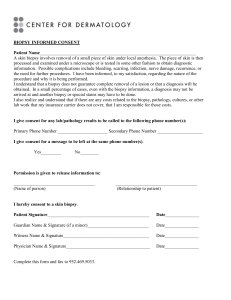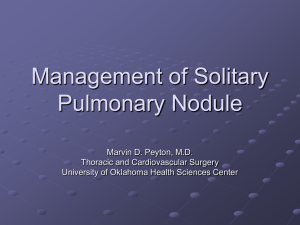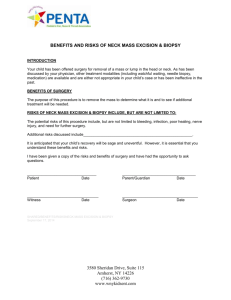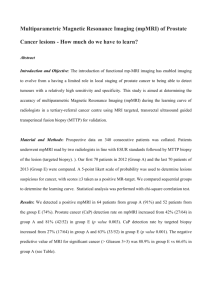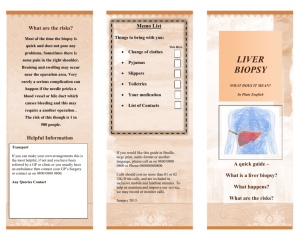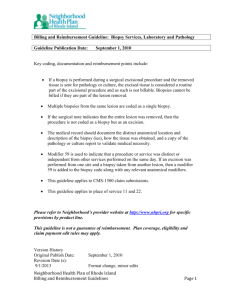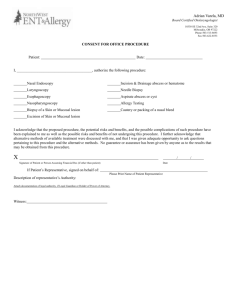This is the template leaflet
advertisement
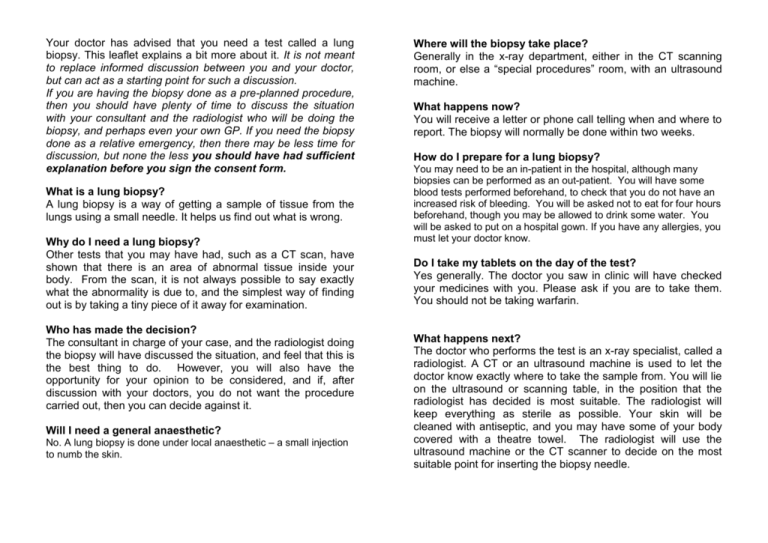
Your doctor has advised that you need a test called a lung biopsy. This leaflet explains a bit more about it. It is not meant to replace informed discussion between you and your doctor, but can act as a starting point for such a discussion. If you are having the biopsy done as a pre-planned procedure, then you should have plenty of time to discuss the situation with your consultant and the radiologist who will be doing the biopsy, and perhaps even your own GP. If you need the biopsy done as a relative emergency, then there may be less time for discussion, but none the less you should have had sufficient explanation before you sign the consent form. What is a lung biopsy? A lung biopsy is a way of getting a sample of tissue from the lungs using a small needle. It helps us find out what is wrong. Why do I need a lung biopsy? Other tests that you may have had, such as a CT scan, have shown that there is an area of abnormal tissue inside your body. From the scan, it is not always possible to say exactly what the abnormality is due to, and the simplest way of finding out is by taking a tiny piece of it away for examination. Who has made the decision? The consultant in charge of your case, and the radiologist doing the biopsy will have discussed the situation, and feel that this is the best thing to do. However, you will also have the opportunity for your opinion to be considered, and if, after discussion with your doctors, you do not want the procedure carried out, then you can decide against it. Will I need a general anaesthetic? No. A lung biopsy is done under local anaesthetic – a small injection to numb the skin. Where will the biopsy take place? Generally in the x-ray department, either in the CT scanning room, or else a “special procedures” room, with an ultrasound machine. What happens now? You will receive a letter or phone call telling when and where to report. The biopsy will normally be done within two weeks. How do I prepare for a lung biopsy? You may need to be an in-patient in the hospital, although many biopsies can be performed as an out-patient. You will have some blood tests performed beforehand, to check that you do not have an increased risk of bleeding. You will be asked not to eat for four hours beforehand, though you may be allowed to drink some water. You will be asked to put on a hospital gown. If you have any allergies, you must let your doctor know. Do I take my tablets on the day of the test? Yes generally. The doctor you saw in clinic will have checked your medicines with you. Please ask if you are to take them. You should not be taking warfarin. What happens next? The doctor who performs the test is an x-ray specialist, called a radiologist. A CT or an ultrasound machine is used to let the doctor know exactly where to take the sample from. You will lie on the ultrasound or scanning table, in the position that the radiologist has decided is most suitable. The radiologist will keep everything as sterile as possible. Your skin will be cleaned with antiseptic, and you may have some of your body covered with a theatre towel. The radiologist will use the ultrasound machine or the CT scanner to decide on the most suitable point for inserting the biopsy needle. Then your skin will be anaesthetised with local anaesthetic, and the biopsy needle inserted into the relevant area in the lung and a small sample of tissue taken. Generally one or two samples are taken. The samples are then sent to the laboratory and are examined under the microscope by a specialist called a pathologist. While the first part of the procedure may seem to take a while, actually doing the biopsy does not take very long at all, and the needle may be in and out so quickly that you barely notice it. Will it hurt me? Most biopsies do not hurt at all. When the local anaesthetic is injected, it will sting to start with, but this soon passes off, and the skin and deeper tissues should then feel numb. Later, you may be aware of the needle passing into your body, but this is generally done so quickly, that it does not cause any discomfort at all. There will be a nurse, or another member of clinical staff, standing next to you and looking after you. If the procedure does become painful for you, then they will be able to arrange for you to have more painkillers. Some people have a bit of pain afterwards once the anaesthetic has worn off. If you do have any pain you can take a painkiller like paracetamol (up to 2 tablets, 4 times a day). How long will it take? It is usually a quick procedure, but may take up to 45 minutes. What are the risks of having a lung biopsy? It is quite common for a little air to escape into the space around the lung during the biopsy. This may cause the lung to partially collapse. We call this a pneumothorax. Recent research shows this may happen in around 1 in 5 of procedures. Usually a pneumothorax is small and does not cause any problems. Rarely, (in up to 3 out of 100 procedures), a lot of air leaks out and causes a big pneumothorax. If that were to happen then we would treat it by either sucking the air out again with a needle (this is called aspiration) or by putting in a tube to let the air out (the tube is called a chest drain). If this happened you would probably have to stay in hospital for a day or two. It is quite normal to cough up some streaks of blood at the time or for a day or two after the procedure. Very rarely a more significant bleed can occur, in which case you should contact your GP or the assessment unit at the hospital. There are reports of death following biopsy, resulting from very major bleeding or from air getting into the blood vessels (air embolism). This however is a very rare occurrence. The risks quoted in the literature range between 1 in 1000 and 1 in 5000, but this very much depends on the location of the abnormality within the lung that is being biopsied. What happens afterwards? You will be taken back to your ward on a trolley. Nurses on the ward will carry out routine observations, such as taking your pulse and blood pressure to make sure that there are no problems. You will generally stay in bed for a few hours, until you have recovered. You may have a chest x-ray performed following the biopsy, usually at about 4 hours. Can I go home after the procedure? Most people are able to go home after 4 hours observation on the ward, but there must be someone to stay with you overnight. Unfortunately, not all biopsies are successful. This may be because, despite taking every possible care, the piece of tissue which has actually been obtained is normal tissue rather than abnormal. Alternatively, although abnormal tissue has been obtained, it may not be enough for the pathologist to make a definite diagnosis. Will there be any side effects after the biopsy? Most people have no problems. If you suddenly become short of breath or have severe chest pain, this may mean that there has been an air leak (a pneumothorax). You should contact the A&E department straight away to be seen and have another chest X-ray. Can I drive after the biopsy? Someone else must drive you home after the test. You should be able to drive again the next day if you feel well. Are there any problems flying in an aircraft after the biopsy? You should normally not fly for 6 weeks. If you wish to fly in less than 6 weeks please discuss this with your hospital doctor. Information for patients LUNG BIOPSY When can I go back to work? You should be able to go back to work the day after the lung biopsy unless advised otherwise. When will I get the results? It can take up to a week for the results to come back to the doctor who asked for the test. You will be given an appointment to see the doctor again. If you have not heard from the hospital within 10 days of the biopsy you should telephone the consultant’s secretary to make another appointment. Some of your questions should have been answered by this leaflet, but remember that this is only a starting point for discussion about your treatment with the doctors looking after you. Make sure you are satisfied that you have received enough information about the procedure, before you sign the consent form. Please ask any questions you have or if you want any clarification regarding any of the above information. Thank you. Date: September 2007 Review date: 2009 Ref: B-151/I/LJ/CTScan Derriford Hospital Derriford Road Plymouth PL6 8DH Tel: 0845 155 8155

